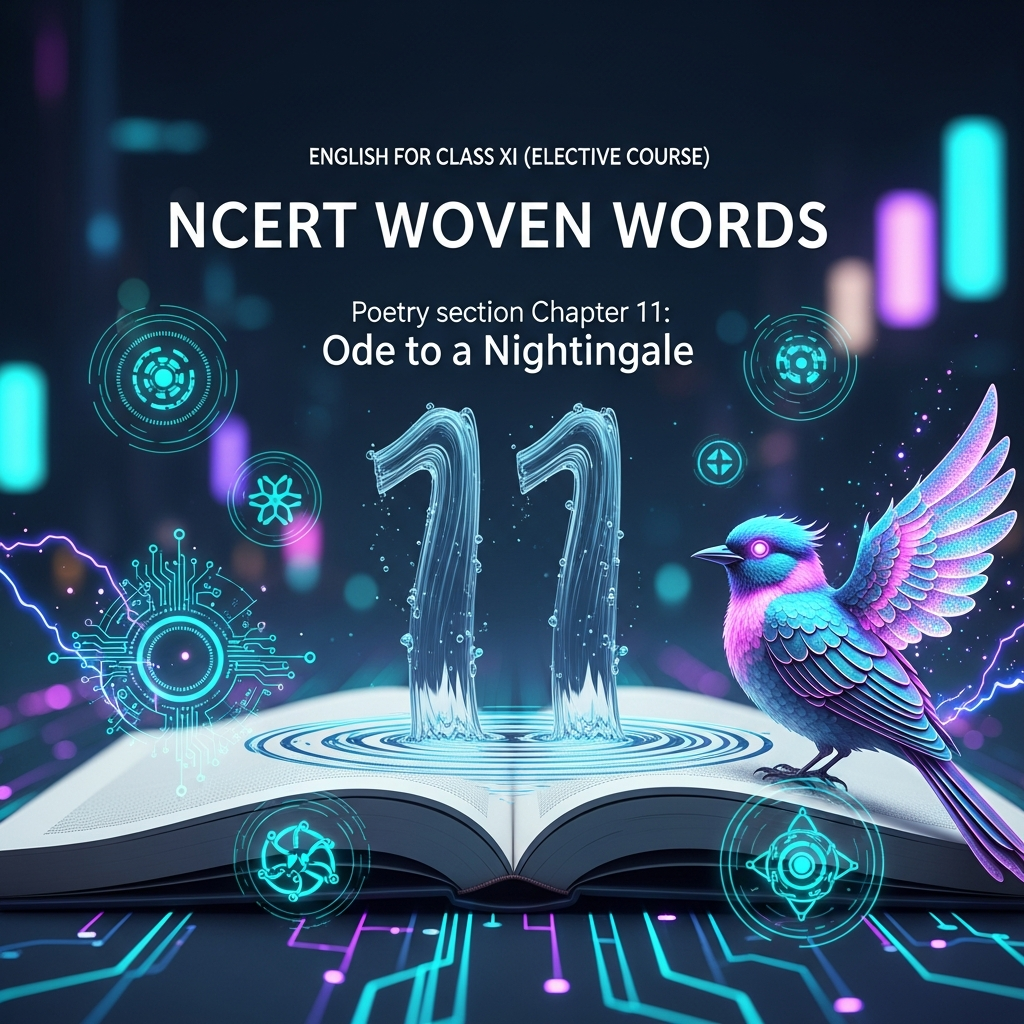Introduction to Poetry - Woven Words
Poetry is a form of literature that uses aesthetic and rhythmic qualities of language—such as phonaesthetics, sound symbolism, and metre—to evoke meanings in addition to, or in place of, a prosaic ostensible meaning.
In Romantic poetry, like Keats', focus is on emotion, nature, and the sublime. The ode form allows introspection and celebration. This poem exemplifies escapism through nature's beauty amid human suffering.
The poem differs from prose in its use of imagery, metaphor, and structure to convey complex emotions concisely.
Key Elements
- Structure: Stanzas, rhyme, metre (iambic pentameter).
- Themes: Mortality, beauty, escapism.
- Types: Ode (lyric addressing a subject).
- Economy: Condensed language for profound impact.
Reprint 2025-26
Full Poem Text: Ode to a Nightingale
My heart aches, and a drowsy numbness pains
My sense, as though of hemlock I had drunk,
Or emptied some dull opiate to the drains
One minute past, and Lethe-wards had sunk:
’Tis not through envy of thy happy lot,
But being too happy in thine happiness,
That thou, light-winged Dryad of the trees,
In some melodious plot
Of beechen green, and shadows numberless,
Singest of summer in full-throated ease.
O, for a draught of vintage! that hath been
Cool’d a long age in the deep-delved earth,
Tasting of Flora and the country green,
Dance, and Provencal song, and sunburnt mirth!
O, for a beaker full of the warm South,
Full of the true, the blushful Hippocrene,
With beaded bubbles winking at the brim,
And purple-stained mouth;
That I might drink, and leave the world unseen,
And with thee fade away into the forest dim.
Fade far away, dissolve, and quite forget
What thou among the leaves hast never known
The weariness, the fever, and the fret
Here, where men sit and hear each other groan;
Where palsy shakes a few, sad, last gray hairs,
Where youth grows pale, and spectre-thin, and dies;
Where but to think is to be full of sorrow
And leaden-eyed despairs,
Where Beauty cannot keep her lustrous eyes,
Or new Love pine at them beyond to-morrow.
Thou wast not born for death, immortal Bird!
No hungry generations tread thee down;
The voice I hear this passing night was heard
In ancient days by emperor and clown:
Perhaps the self-same song that found a path
Through the sad heart of Ruth, when, sick for home,
She stood in tears amid the alien corn;
The same that oft-times hath
Charm’d magic casements, opening on the foam
Of perilous seas, in faery lands forlorn.
Forlorn! the very word is like a bell
To toll me back from thee to my sole self!
Adieu! the fancy cannot cheat so well
As she is fam’d to do, deceiving elf.
Adieu! adieu! thy plaintive anthem fades
Past the near meadows, over the still stream,
Up the hill-side; and now ’tis buried deep
In the next valley-glades:
Was it a vision, or a waking dream?
Fled is that music:—Do I wake or sleep?
Reprint 2025-26
Poem Summary: English & Hindi (Detailed Overview)
English Summary (Approx. 1 Page)
The speaker feels numb pain, envying the nightingale's joyous song. Wishing for wine to escape reality, he imagines fading into nature. Contrasting bird's bliss with human suffering (age, death, despair), he calls it immortal, timeless across history. "Forlorn" pulls him back; bidding adieu, he questions if the vision was real or dream.
हिंदी सारांश (संक्षिप्त)
वक्ता सुन्न दर्द महसूस करता है, नाइटिंगेल के आनंदित गीत से ईर्ष्या करता है। वाइन की इच्छा से वास्तविकता से भागना चाहता है, प्रकृति में विलीन होने की कल्पना करता है। पक्षी की खुशी को मानव पीड़ा (उम्र, मौत, निराशा) से तुलना करता है, उसे अमर, कालातीत कहता है। "फॉरलॉर्न" उसे वापस खींचता है; विदा कहकर, वह पूछता है कि क्या दृष्टि वास्तविक थी या सपना।
Reprint 2025-26
Language Work
Look for these words and guess their meanings from the context
Words:
- hemlock: Poisonous plant (numbness).
- deep-delved earth: Deep-dug ground (aged wine).
- beechen green: Beech-tree greenery (natural setting).
- deceiving elf: Misleading imagination (fancy).
- plaintive anthem: Mournful song (nightingale's).
Try This Out
1. Juxtaposed opposites (numbness pains, waking dream) create tension—oxymoron. Pairs: bitter-sweet (other poems).
2. Wine evokes inspiration, escape—Hippocrene as poetic muse.
3. Sound: full-throated ease; sight: beechen green; taste: sunburnt mirth.
4. Apostrophe—addresses nightingale directly.
5. Adjectives: drowsy numbness (pains); Phrases: light-winged Dryad, beaded bubbles.
6. Other Keats odes: Grecian Urn, Autumn.
7. Shelley odes: West Wind, Skylark.




